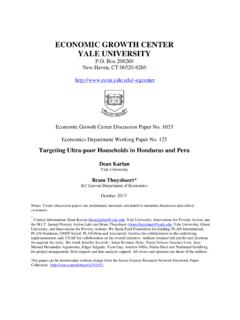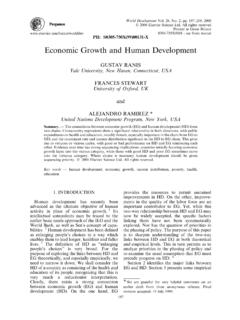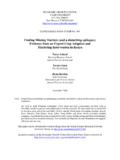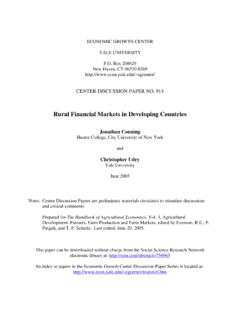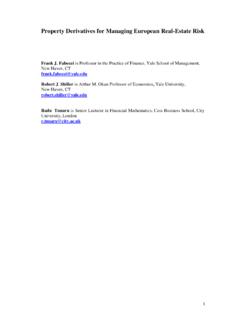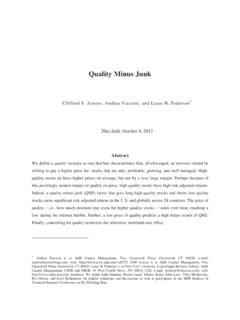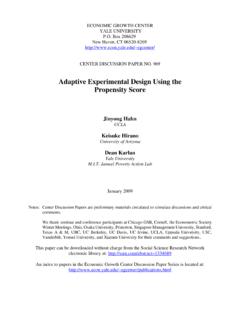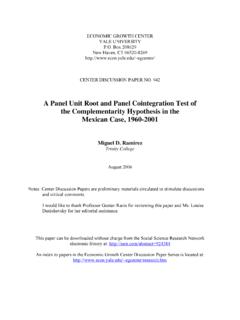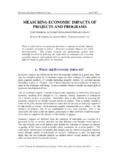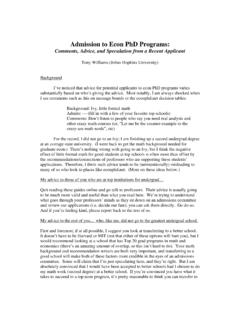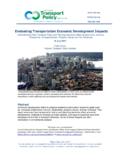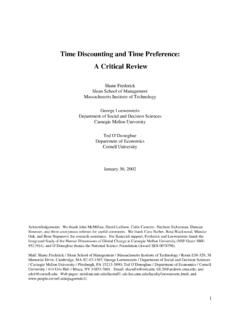Transcription of ECONOMIC GROWTH CENTER - Department of …
1 ECONOMIC GROWTH CENTER . YALE UNIVERSITY. Box 208269. New Haven, CT 06520-8269. ~egcenter/. CENTER DISCUSSION PAPER NO. 840. HIGHWAY FRANCHISING. AND REAL ESTATE VALUES. Eduardo Engel Yale University Ronald Fischer University of Chile and Alexander Galetovic University of Chile February 2002. Note: CENTER Discussion Papers are preliminary materials circulated to stimulate discussions and critical comments. This paper can be downloaded without charge from the Social Science Research Network electronic library at: An index to papers in the ECONOMIC GROWTH CENTER Discussion Paper Series is located at: ~ HIGHWAY FRANCHISING AND REAL ESTATE VALUES. BY EDUARDO ENGEL, RONALD FISCHER AND ALEXANDER GALETOVIC1.
2 February 2002. Abstract It has become increasingly common to allocate highway franchises to the bidder that offers to charge the lowest toll. Often, building a highway increases the value of land held by a small group of developers, an effect that is more pronounced with lower tolls. We study the welfare implications of highway franchises that benefit large developers, focusing on the incentives developers have to internalize the effect of the toll they bid on the value of their land. We study how participation by developers in the auction affects equilibrium tolls and welfare. We find that large developers bid more aggressively than construction companies that own no land. As long as land ownership is sufficiently concentrated, allowing developers in the auction leads to lower tolls and higher welfare.
3 Moreover, collusion among developers is socially desirable. We also analyze the case when the franchise holder can charge lower tolls to those buying her land ( toll discrimination'). Relative to uniform tolls, discrimination decreases welfare when land is highly concentrated, but increases welfare otherwise. Finally, we consider the welfare implications of subsidies and bonuses for proposing new highway projects. Key words: Demsetz auctions, highway concessions, private participation in infrastructure. JEL classification: D44, H40, H54, R42, R48. 1. Engel: Yale University and NBER. Address: Department of Economics, Yale University, 28 Hillhouse Ave., New Haven, CT 06511. Fischer and Galetovic: University of Chile.
4 Address: CENTER for Applied Economics (CEA), Department of Industrial Engineering, University of Chile, Av. Rep blica 701, Santiago, Chile. E-mails: Financial support from Fondecyt (grants 1980658 and 1981188) and an institutional grant to CEA from the Hewlett Foundation is gratefully acknowledged. 1 Introduction and motivation The standard way to finance highways leading to new land developments is with general public funds, to be recovered via increased property One problem with this approach, is that the increase in tax receipts takes place after the road is built (and the land developed and sold to new owners), thereby leaving ample space for opportunistic behavior by landowners and land developers.
5 For example, they could vote down a tax increase after the road is built, or, alternatively, lobby for socially undesirable projects that collect far less taxes than suggested by the optimistic forecasts of the Given this problem, during the last decades franchises have become an increasingly popular way of financing highways,4 operating under so called build-operate-and-transfer (BOT) These franchises are usually awarded in competitive auctions to the bidder that offers to charge the lowest toll for a pre-specified period. In this paper we study the welfare consequences of highway franchises that benefit large land developers. In doing so we address several questions: (a) Should large landowners be allowed to participate in the auction, or do they have an undue advantage ( , one that leads to a decrease in welfare)?
6 (b) How does an auction compare with a monopoly road owner? (c) Should a franchise holder that owns land be allowed to offer lower tolls to the buyers of his tracts of land? (d) Should collusion among bidders be deterred? (e). What are the welfare consequences of government subsidies for building the road or government bonuses for the proponents of a new project? We find that large developers bid more aggressively than construction companies that own no land. As long as land ownership is sufficiently concentrated, allowing developers in the auction leads to lower tolls and higher welfare. Moreover, collusion among developers is socially desirable. We also analyze the case when the franchise holder can charge lower tolls to those buying her land ( toll discrimination').
7 Relative to uniform tolls, discrimination decreases welfare when land is highly concentrated, but increases welfare otherwise. A specific example is useful to motivate most of the issues considered. In 1999 the Chilean government decided to franchise the US$170MM road through the valley of Chicureo, a formerly rural area near Santiago which is slotted for major expansion. The project was proposed by a private group, and would add value to the substantial extensions of land this group owns in the area to be served by the road. According to the Chilean Concessions Law of 1994, anybody can propose a highway project. If approved by the Ministry of Public Works, the project is franchised in an open auction and the proponent of the project receives a bonus in the auction, implying that she may win even if she does not make the best offer.
8 Shortly after the project was approved by the Ministry of Public Works, the original proponents formed an agreement with other large landowners in the valley in order to participate in the auction. Moreover, this consortium is 2 The idea is that a substantial part of the highway's benefits are reflected in higher land prices. 3 Moreover, even if landholders and land developers do not behave opportunistically, it may still be difficult for the government to determine whether a project is beneficial before undertaking it, since it may be difficult to obtain precise estimates of the future commercial value of the land. 4 See, for example, G omez-Iba nez and Meyer [1993], and the collection of papers in Irwin et al.
9 [1997]). 5 Under such a contract, a private firm builds and finances the road and then collects tolls for a long period (usually between 10. and 30 years). When the franchise ends the road is transferred to the state. 1. considering implementing a scheme by which buyers of their land will not have to pay tolls during the first few years (Magni, 2000). Finally, there were no participants when the road was auctioned in 2000, with the proponents arguing that a more generous subsidy than that offered by the government was required, since toll revenue was insufficient to finance the ,7. Throughout the paper we consider socially desirable roads, that is, roads such that if built, the increase in welfare (reflected in the price of the land) is higher than the cost of building the road when no tolls are Roads that satisfy these conditions should be built.
10 However, there is no guarantee that they will be built, since franchise holders do not necessarily appropriate all of the benefits produced by the road, unless they happen to own all the land that increases its value thanks to the project. We examine two options for building the road: first, an unplanned or laissez faire approach, which serves as a benchmark, in which the owner of a tract of land builds a road and charges a toll for its use. There is no coordination with other landowners and the franchise holder is free to choose the toll at her discretion. The second option is to have the government franchise the project in a competitive auction, to the bidder offering the lowest toll.

